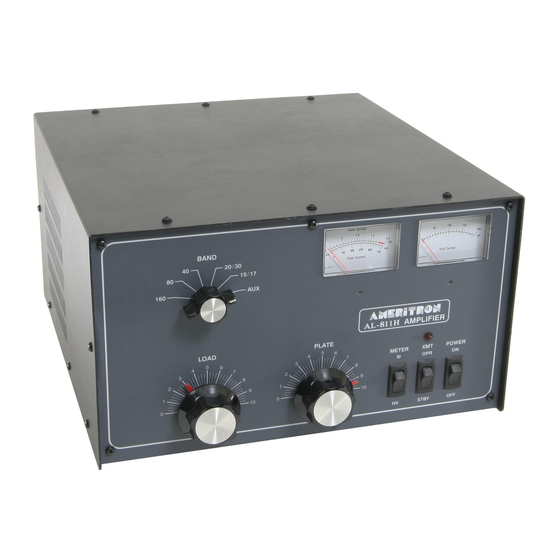AMERITRON AL-811H Instrucciones de desembalaje Manual - Página 2
Navegue en línea o descargue pdf Instrucciones de desembalaje Manual para Amplificador AMERITRON AL-811H. AMERITRON AL-811H 11 páginas. Hf power linear amplifier
También para AMERITRON AL-811H: Manual de instrucciones (12 páginas), Manual del usuario (19 páginas), Manual (13 páginas)

FEATURES
The AL-811H is a grounded grid linear amplifier developed by
Ameritron using low cost 811A power triodes. It operates in
class AB2 for SSB and CW.
1.
Fast Warm Up Time: The 811A tubes take approximately
10 seconds to warm-up.
2.
Long Tube Life: The 811A tubes are long life, reliable
transmitting tubes.
811A tubes offer rugged, reliable
operation even on RTTY and SSTV.
3.
Tuned Input: A Pi-Network tuned input matches the 811A
tubes to 50 ohm exciters.
4.
Two Illuminated Panel Meters: The AL-811H has two
illuminated panel meters. The Grid Current meter provides
a continuous reading of the 811A grid current to indicate
proper loading of the amplifier. The other meter switches
between high Voltage (HV) and Plate Current (Ip).
5.
Multi-voltage Heavy Duty Transformer:
"buck-boost" winding allows adjustment of primary
voltages to match a wide range of line voltages centered on
110 and 230 volts. This versatile Ameritron feature allows
the user to maintain optimum voltages on the tubes and
other components to obtain maximum performance and life.
6.
Vernier Plate and Load Adjustments:
controls have vernier 6:1 reduction drives for smooth tuning
logging scales for accurate and rapid tune-up.
7.
Safety interlock: AC input power is removed from the
transformer when the cover is removed. Never attempt to
defeat this switch.
8.
Operate/Standby Switch: Used to remove the amplifier
from the RF line while filament and plate voltages are
maintained during "barefoot" operation.
9.
XMT Indicator LED: Provides a front panel indication of
proper amplifier keying by the exciter.
10. ALC: The drive level is detected to provide a control
voltage for the exciter. ALC prevents over-driving of the
linear and reduces distortion from excessive drive power.
11. Neutralization Circuit: Reduces unwanted feedback to
improve performance.
CAUTION: This amplifier must be disconnected from the
power mains before removing the cover. See the precaution
on page 7.
TECHNICAL SPECIFICATION AL-811H *
Frequency Coverage
AL-811H LINEAR AMPLIFIER
A unique
Both tuning
From The N3UJJ.COM Document Library
From The N3UJJ.COM Document Library
Domestic model(AL-811H): 160, 80, 40, 30, 20, 17 and 15
meter bands
Export model(AL-811HX/HY): 160, 80, 40, 30, 20, 17, 15, 12,
Input
Circuit type: Pi-network, slug tuned coils
Maximum VSWR at resonance: 1.3:1
Minimum 2:1 VSWR bandwidth: 15%
Maximum drive power permissible: 85 watts
Typical drive for rated output: 65 watts
Output (7MHz)
Typical SSB PEP voice operation: over 800 watts continuous
Typical CW continuous operation: 600 watts
1/2 hour PEP two tone: 650 watts
1/2 hour continuous carrier: 400 watts
ALC
Negative going, 0-12V, adjustable, phono jack
Power Supply
Circuit type: full wave bridge rectifier
No load voltage: 1700V
Full load voltage: 1500V
Full load current: 700mA
Regulation: 15%
Maximum draw at rated output: 10A (120V)
AC Input: 120V, 50/60 Hz (AL-811H/HY
240V, 50/60 Hz (AL-811HX)
Metering
Multimeter: reads HV and plate current
Grid meter: reads PA grid current
Connectors
Relay: keys amplifier when grounded. Sources +12 VDC open
circuit and supplies 100mA when grounded. A built-in
pulse canceling diode protects the exciter.
RF input: SO-239, 50 ohm input.
RF output: SO-239, 50 ohms with full power, into any SWR
below 3:1.
Power: NEMA 5-15P 120V grounded style.
ALC: Phono Jack. Supplies up to 12 volts of negative voltage
for ALC control of exciters.
Physical
Dimensions: 15.5" D x 13.75"W x 8.25"
Weight: 30 lbs.
* Specifications are subject to change without notice or obligation.
Exact performance measurements may vary due to the accuracy of the test
equipment and the measurement methods used.
and 10 meter bands.
2
